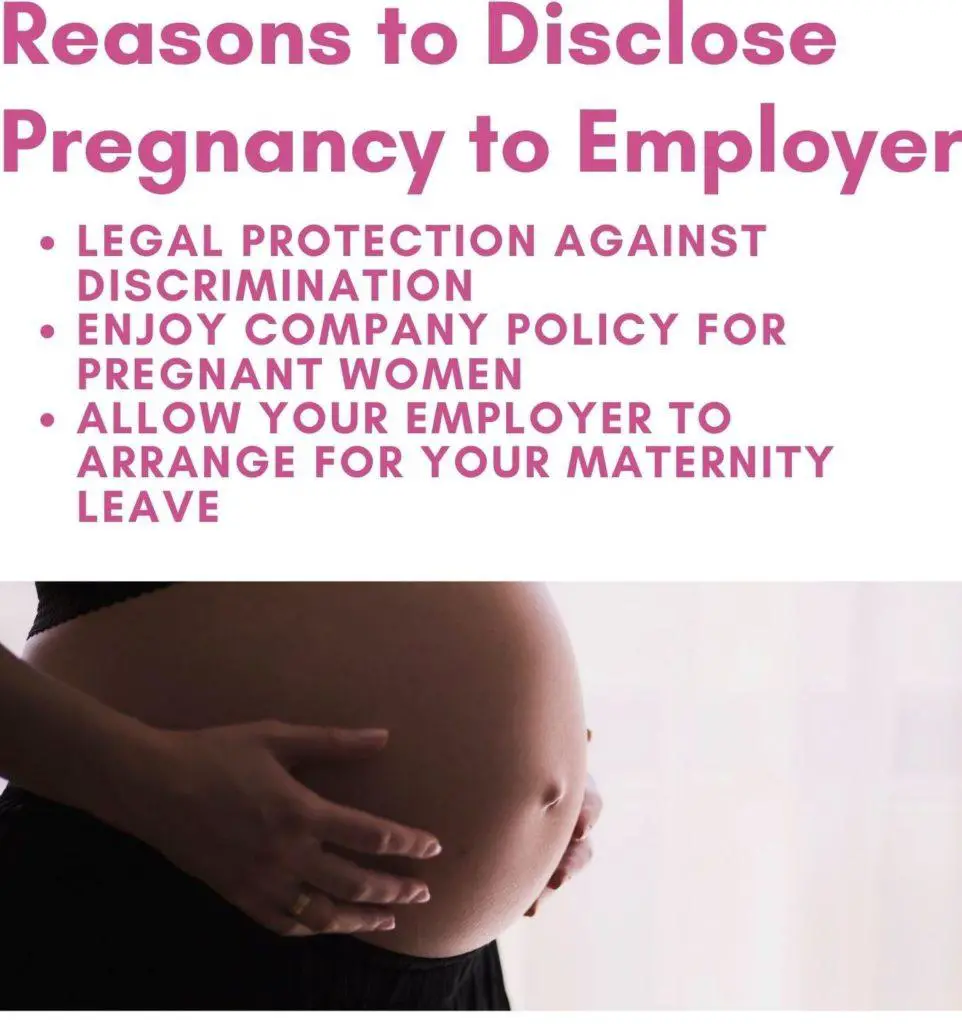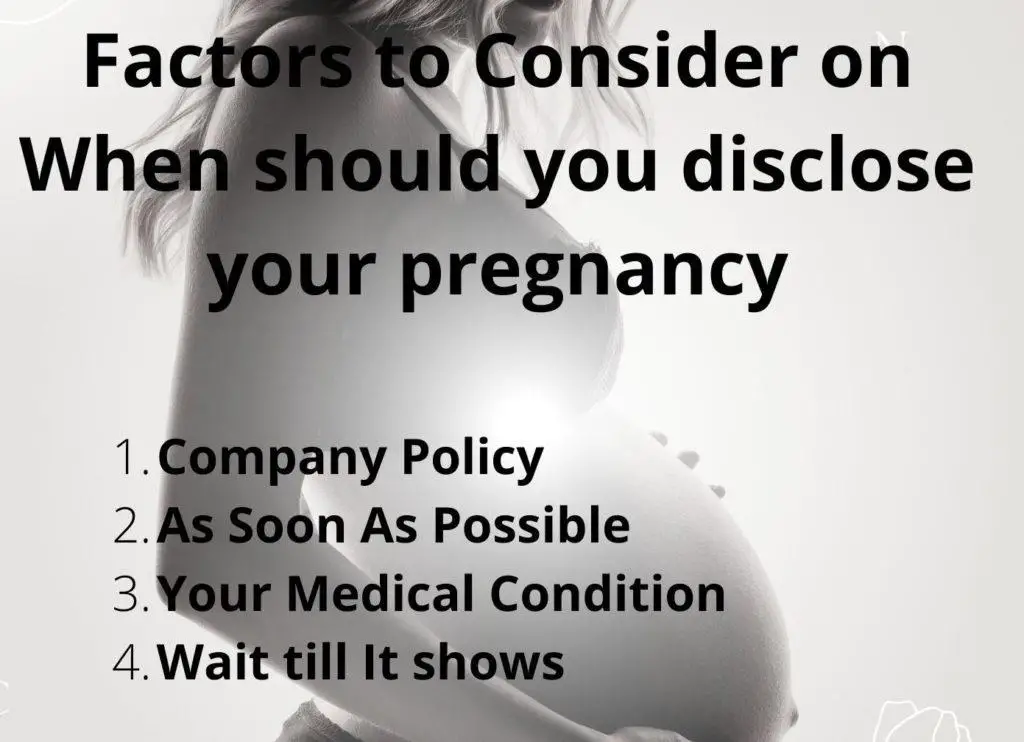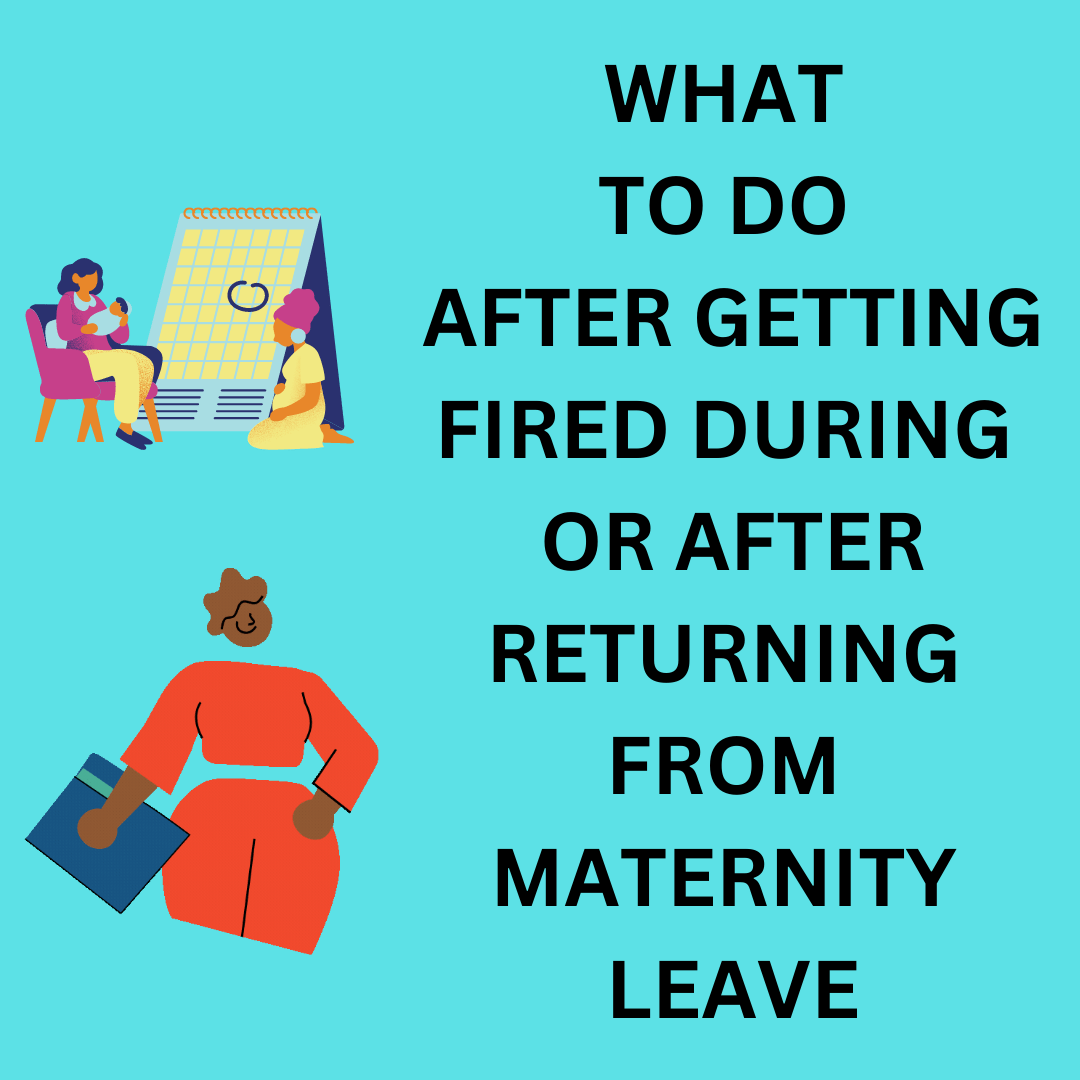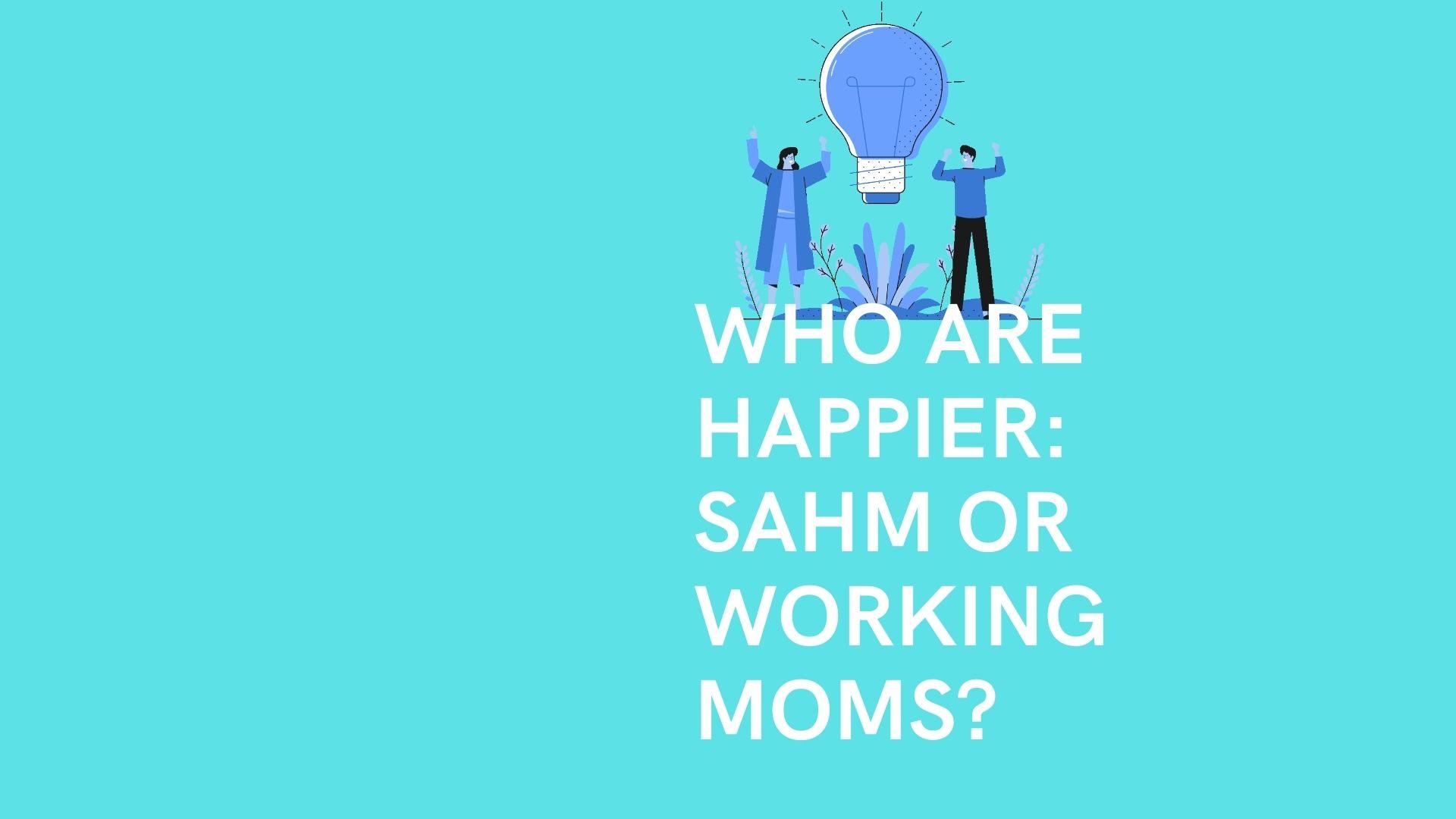Should you Disclose Pregnancy to Employer
Pregnancy news are often good news but are equally personal and private and many consider telling the employer about it unnecessary . However it is important that you tell your boss that you are expectant, both for you and your employer benefit.
As such, yes should disclose your pregnancy status to your employer.
You are then able to gain legal protection against discrimination, enjoy work benefits privileges offered by employer, and allow for role transition as your employer arranges for your maternity leave.
The best time to do this however varies from one situation to another. Ensure that you follow your company’s policy, and consider your medical condition, or personal preference when deciding on the timing to disclose the pregnancy news.
However it is best to communicate as soon as you find out. You can equally wait till the doctor advises you to, till the pregnancy shows or when you personally feel you are ready to break the news to your boss. When ready you can then write an email ,a letter, a phone message or simply have a one to one physical meeting to disclose the news.

Benefits of Disclosing your Pregnancy to Employer
1. Gain Legal Protection from Discrimination
Many pregnant women have faced all manners of discrimination at the workplace because they were pregnant. Announcing your pregnancy news to your employer, in writing will protect your legally in case of any pregnancy-related discrimination later on.
The Pregnancy Discrimination Act (PDA), the Americans with Disabilities Act (ADA), and the Family and Medical Leave Act (FMLA) provide protections for pregnant employees. These laws ensure that pregnant employees cannot be discriminated against and are entitled to certain accommodations during their pregnancy.
Some pregnant moms are fired, demoted, and lose their jobs after maternity leave. Data from the Equal Employment Opportunity Commission (EEOC) indicates that between 2011 and 2015, women filed approximately 31,000 charges of pregnancy discrimination. This statistic highlights the prevalence of the issue and underscores the importance of disclosing pregnancy to ensure legal protections are in place.
Most women are unable to legally prove such cases of pregnancy discrimination as there is no evidence of its communication. While your pregnancy may be clear, your employer can easily deny being in the knowledge of your pregnancy hence your discrimination grounds on this basis are tested.
Tom Spiggle, a lawyer specializing in employment discrimination, emphasizes that “announcing your pregnancy in writing protects you legally in case of any pregnancy-related discrimination later on”.
Read: How to Handle Pregnancy Discrimination at the Workplace
2.You Enjoy Benefits offered by Employer
Disclosing your pregnancy status allows you to enjoy key advantages in the workplace. Some companies are mom friendly and have family friendly policies in place. You will enjoy privileges that allow them to work as well as take care of your family.
The privileges include ;
- Flexible work hours
- Working from home
- Frequent breaks
- Bed rest
- Sick off days
These privileges are meant to ensure that you are comfortable in your space as a mom-to-be so that you can deliver at the workplace. Employers have a duty to accommodate pregnancies provided they have knowledge of it. You can only however have these arrangements done officially when you have communicated your status in good time.
Read: How to Address Sexual Harassment at Work
3. Allow Arrangements for your Maternity Leave
It is important to ensure there is a capable person to relieve you of your duties when your delivery date is due and you are on your maternity leave. Doing so requires adequate time and training. Communicating your pregnancy status in good time allows your employer to make arrangements for your maternity leave and other job adjustments.
Different positions have different difficulties in finding a suitable replacement. Top positions are especially sensitive and need adequate time for training. By communicating early you will have adequate time to train and make the transition easier with the employee who will take up your duties.
Such easy and smooth transition is important for continuity at your workplace without affecting or disturbing operations too much in your absence. It also helps so your employer avoids including you in upcoming projects as you shall be away on maternity leave.
Read: Staying Motivated at Work while Pregnant

When to Disclose your Pregnancy to Employer
While the importance of disclosing the news of your pregnancy is clear, it has not been standard when this should happen. The time of disclosing your pregnancy may depend on your company policy, your medical condition, or personal preference.
1. Follow the Company Policy
Most companies and employers have a policy guiding when you should let the office know that you are expectant. HR professionals often recommend that employees familiarize themselves with their company’s policies regarding pregnancy.
Some companies will require you to disclose as soon as possible such as the military. Others have a timeline for this communication. You should therefore consult your HR office and follow this policy if it exists to know when is the best time to let you employer know about your pregnancy.
2. As Soon As Possible
Communicating as soon as possible is important so that you get the right protection and precautions for protecting both you and the baby. It technically means communicating to your employer as soon as you find out that you are pregnant.
It is especially important if you work in a field that may expose you to hazards or threats that can harm your baby. Such includes nursing field mechanic, lab assistant, etc whereby you are exposed to many vulnerabilities ,infections or hazardous materials.. Communicating your status in time helps get the necessary precautions in place.
Also, communicating asap will explain your morning sickness and the reasons you may need extra understanding at the workplace.For some moms, morning sickness during the first trimester can also affect their productivity and performance at work. Hence it is important that your employer/supervisor is aware of your condition as soon as possible.
3. Follow Doctor’s Instructions
Your medical condition may guide you on the best time to communicate your pregnancy condition to the employer. For instance, if you are carrying a high-risk pregnancy, it is important to communicate as directed by your doctor.
This is because you may need to take bed rest or sick off days or adjustment of work duties when needed. Communication of your pregnancy news as well as your doctor’s instructions will be helpful to you to go through a safe pregnancy.
Read: Reasons to Take an Early Maternity Leave
4. Wait till the Pregnancy Shows
Some moms just waits out instead of telling the employer about it. This means that they wait until the pregnancy shows and hopefully this is meant to communicate this news to the supervisor or the employer.
Unfortunately, this approach may not helpful to you in several cases. You may not get any job or work environment adjustments to support your pregnancy. Also you may not prove cases of pregnancy discrimination should they happen and hence your employer can easily get away with it.
5. When you Personally Prefer
Here it all depends on personal preference and when you would personally prefer to communicate about pregnancy news to the employer.
- You may have had a previous miscarriage and wants to wait. Some moms wait until their second semester because the risk for miscarriage goes down significantly. You hence reduces any chances of having to deal with an announced pregnancy that is later terminated.
- If you have had to try to get pregnant for a long time, you may want to wait it out longer for personal reasons and that is also okay. Some wait until it is the third semester for this reason.
- Alternatively you make wait till an opportunity comes up. For instance, your employer may include you in a project exposing you to danger or one happening past your due date. This is an opportunity to let your employer know why they need to re-plan/reschedule.
- Also, some prefer not to communicate at all, especially those under casual engagement rather than contractual terms.
Whichever time you choose to communicate, it is better coming from you rather than from anybody else.
How to Disclose Your Pregnancy to your Employer
Make the communication official rather than casual. Further, there should be a documentable record or evidence of the same.
Legal experts advise that having a documented record of your pregnancy disclosure is crucial. As noted, “Most women are unable to legally prove such cases of pregnancy discrimination as there is no evidence of its communication”
There are different ways of disclosing news of your pregnancy news to your employer. They include;
- Write a Letter -You can write a letter and address it to your HR /Employer. Keep a copy of the same.
- Email – You can email your supervisor/HR /Employer about the news of your employer. It is a very simple and straight forward way of letting your employer know that you are expectant.
- Write a Message -You can message your supervisor/HR /Employer about the news of your pregnancy. Also, keep the message for future reference. If you have no access to email or paper, you can write your employer a simple phone message.
- Have a Talk with your Employer -You can decide to just tell your employer about your pregnancy on a one-to-one talk. This is the most common way women use but it is not protected if no write-up exists. It is hence proper to follow it up in writing either through email or letter after this meeting.
What New Mothers Are Saying
“When I found out I was pregnant, I was nervous about telling my boss. I decided to share the news early, and it turned out to be the best decision. My manager was incredibly supportive and even adjusted my workload to accommodate my needs. Knowing I had their support made all the difference during my pregnancy.”
— Sarah M., Marketing Manager
“I waited too long to disclose my pregnancy, and when I finally did, I felt a shift in my workplace dynamics. Unfortunately, I faced some discrimination afterward. If I had communicated earlier and documented everything, I believe it would have helped me navigate the situation better.”
— Emily R., Graphic Designer
“I had no idea about my rights when I first told my employer about my pregnancy. Thankfully, after reading up on the Pregnancy Discrimination Act, I felt empowered to stand up for myself when things didn’t go as planned. Knowledge is truly power!”
— Nina K., Software Developer
FAQ Section
1. When should I disclose my pregnancy to my employer?
It’s generally recommended to inform your employer as soon as you feel comfortable, ideally after the first trimester. This allows for necessary accommodations and planning for your maternity leave. Nonetheless always consider your company’s policies and your personal circumstances.
2. What are the legal protections I have when I disclose my pregnancy?
Under the Pregnancy Discrimination Act (PDA) and other relevant laws, you are protected from discrimination based on your pregnancy status. Disclosing your pregnancy in writing helps ensure you have legal protection if issues arise later.
3. How can I communicate my pregnancy to my employer?
You can communicate your pregnancy through a formal letter, an email, or a face-to-face meeting. It’s essential to document this communication for your records. Make sure to follow up with written confirmation if done in person.
4. What benefits might I gain by disclosing my pregnancy?
Disclosing your pregnancy can allow you to access workplace benefits such as flexible working hours, additional breaks, and support for maternity leave planning. Many employers have family-friendly policies that can assist you during your pregnancy.
5. What if I experience morning sickness or other pregnancy-related issues?
If you experience morning sickness or other issues, it’s advisable to inform your employer as soon as possible. This helps them understand your situation and make necessary accommodations to support your health and productivity.
6. Can I wait until my pregnancy is obvious to tell my employer?
While some choose to wait, it’s generally better to disclose your pregnancy sooner. Waiting may limit your ability to secure accommodations and could complicate matters if you face any workplace discrimination.
7. What should I do if I face discrimination after disclosing my pregnancy?
If you experience discrimination after disclosing your pregnancy, document all instances and communicate with your HR department. You may also want to consult with an employment lawyer to explore your options.
8. How does my company’s policy affect when I should disclose my pregnancy?
Many companies have specific policies regarding the disclosure of pregnancy. Check with your HR department to understand your company’s guidelines, which can help you decide the best timing for your disclosure.
9. Is it necessary to disclose my pregnancy if I’m a temporary or casual employee?
While you are not legally required to disclose your pregnancy in these cases, doing so can still be beneficial. It allows your employer to make necessary accommodations and helps protect your rights.
10. What are the potential consequences of not disclosing my pregnancy?
Failing to disclose your pregnancy may lead to a lack of necessary support, increased stress, and potential issues with job security. It may also complicate matters if you face discrimination, as you may lack documented evidence of your pregnancy status.
Related Articles
Why & How to Quit your Job when Pregnant
How to Hide Pregnancy during Interview
Questions to Ask HR about Maternity Leave
Things to do with on your Maternity Leave
When to Start Looking for Daycare when Pregnant
How to Physically, Emotionally and Financially Prepare for a Second Child



